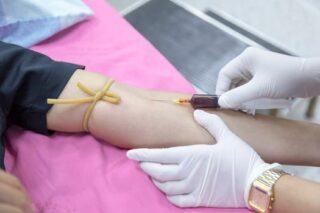
More Weight Control, Nutrition & Exercise Articles
Can Thin Blood Cause You to Feel Colder?

Have you ever wondered, “does thin blood make you colder?” It’s a question that has circled around various health discussions. The notion that thinner blood might affect how cold you feel is intriguing and worth exploring. Essentially, the temperature regulation of the body involves numerous systems, with blood being a key component. In this article, we will delve into whether having “thin” blood can truly make you feel colder and consider other potential factors and explanations.
Does Thin Blood Make You Colder?
To address this question, it’s important to understand what “thin blood” means. Often, the term is used colloquially and can refer to a variety of conditions or effects, including changes in blood viscosity or reduced ability of the blood to clot. Typically, individuals on anticoagulant medication are thought to have “thinner” blood. However, medically speaking, thin blood is not a recognized condition. The sensation of feeling cold is usually caused by other factors.
Understanding Blood Viscosity
Blood viscosity refers to the thickness of blood and how easily it flows through the vessels. When blood is less viscous, it flows more freely, but this typically doesn’t affect your internal temperature directly. The sensation of feeling colder is more intricately linked with how your body regulates and produces heat, which includes the role of the hypothalamus, blood circulation, and metabolic processes.
Temperature Regulation and Circulation
The body maintains its temperature through a complex system of mechanisms. When exposed to cold, blood vessels constrict to reduce heat loss, a process known as vasoconstriction. This mechanism helps retain core temperature but can also make your extremities feel colder. If your blood is flowing like “thin” blood might suggest, it could potentially alter how your body handles these changes, though evidence supporting this is limited.
There are situations and conditions that can impact how sensation and temperature regulation function. For example, conditions like anemia or hypothyroidism can make individuals feel colder more frequently. It’s always beneficial to consult with a healthcare professional if you experience unexplained temperature sensitivity.
Additional Factors Affecting Temperature Sensitivity
Beyond blood characteristics, several lifestyle and physiological factors play a significant role in how cold one might feel:
- Body weight and fat insulation: Lower body fat provides less insulation against cold temperatures.
- Age and metabolism: Metabolic rate can decrease with age, impacting warmth production.
- Hydration levels: Being well-hydrated aids in efficient circulation and energy production.
- Activity levels: Physical activity produces heat as muscles work, contributing to overall warmth.
Consultation and Support
Want to learn more about maintaining body warmth and a healthy diet? Visit our comprehensive guide on the role of a high-protein diet in weight maintenance, which provides insights into balancing your diet for better health outcomes.
Further, if you experience persistent cold sensations or are concerned about blood-related issues, reaching out to a healthcare provider is crucial for appropriate evaluations. They might assess whether underlying health issues such as anemia could be a factor.
For More Comprehensive Information
For detailed scientific insights into blood properties and temperature regulation, you might find this Wikipedia article on body temperature informative. It provides a broad perspective on human thermal regulation.
In summary, while it might seem intuitive to associate thin blood with feeling colder, scientific evidence supporting this is not robust. The body’s thermal regulation involves numerous systems, where blood plays an indirect, though important, role.
Final Thoughts
Understanding body functions such as thermal regulation and blood properties is essential to discern myths from facts, particularly when addressing questions like “does thin blood make you colder.” While there might be peripheral factors contributing to feeling chilly, thin blood isn’t directly linked to this sensation.
- Thin blood is not a medical condition but often relates to blood clotting abilities.
- Feeling cold is typically caused by factors like circulation issues, low body weight, or metabolic conditions.
- Seeking medical advice is advisable for persistent cold sensations to rule out other health issues.
- Maintaining a balanced diet and healthy lifestyle can support better thermal regulation.
- External resources can provide further reading on related health topics.
FAQ
What is considered thin blood?
Thin blood is a non-medical term often used to describe blood with a reduced ability to clot, commonly due to anticoagulant medication.
Can an iron deficiency make you feel cold?
Yes, anemia due to iron deficiency often results in feeling colder, as it impairs oxygen transport needed for metabolic heat production.
Is it possible to naturally thicken blood?
Consult a healthcare provider for strategies to naturally adjust blood viscosity, focusing on overall health and dietary approaches.
How does age affect feeling cold?
As metabolism slows with age, along with potential changes in muscle mass and circulation, older individuals may feel colder more often.
Why are my hands and feet always cold?
Cold extremities can be a sign of reduced circulation or conditions like Raynaud’s phenomenon; consult with a healthcare provider for assessment.
Other Articles You May Find of Interest...
- The Surprising Benefits of Protein in Cheddar Cheese
- Discover the Amazing Benefits of Eating Brazil Nuts for Your Health and Hair Growth
- Is Allulose Safe and What Are Its Side Effects and Ingredients?
- Transform Your Shape with These Effective Glute Exercises
- Discovering the Highest Protein Milk Options for Your Health
- Delicious High Fiber High Protein Meal Ideas for a Healthier You
- Achieve Your Weight Loss Goals: Discover the Timeline to Lose 40 Pounds














